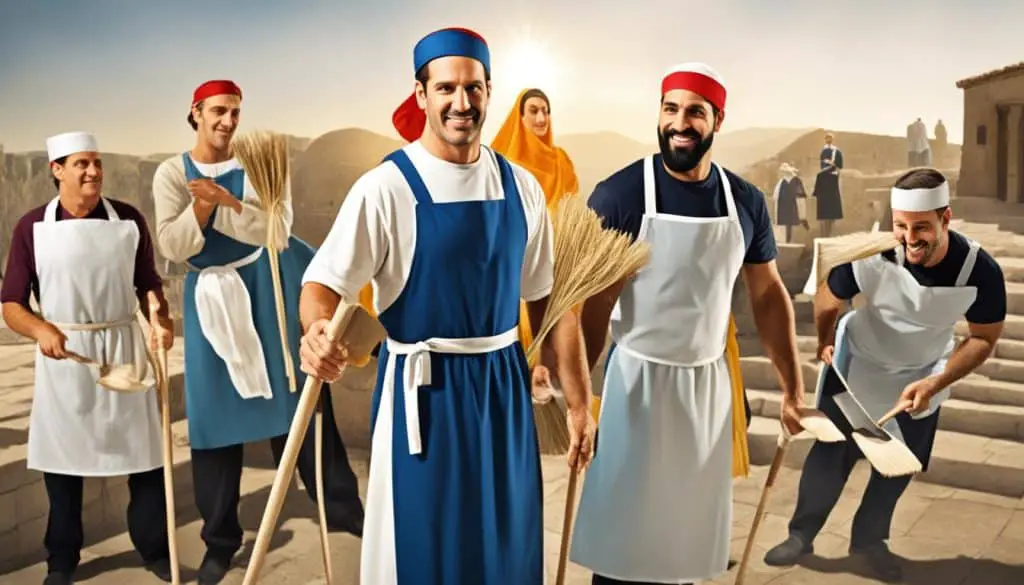Table of Contents
Have you ever wondered about the roles of servants and slaves in biblical times? Their work ranged from indentured servants to those who served kings. They played diverse and essential roles, each with its own story.
This article takes you into the world of biblical history. We will explore the six main kinds of servants and slaves. Each type had a unique place in ancient society, influenced by their time’s social and cultural norms.
Get ready for a journey into the scriptures. We’ll reveal interesting facts about these important yet often overlooked individuals from biblical times.
Indentured Servants
In biblical times, indentured servants had a special place in society. They helped lessen the troubles of poor Israelites, as we read in Leviticus 25:39-55. These people sometimes sold their services for a set time, often up to seven years. This was to deal with tough times and money problems.
Indentured servants were not the same as war slaves. They didn’t become property. Instead, they agreed to work for a time and had rules both sides followed. This way of working helped them pay off what they owed and become stable again.
This picture shows how indentured servitude was important in the past. It helps us see what life was like for these servants.
Foreign Slaves
Foreign slaves were people who got caught in wars or bought from nearby lands. Leviticus 25:44-46 says they could be property and owned like other possessions. Many times, they stayed in a family through generations.
In the past, owning foreign slaves was usual. Countries did this to gain more workers and control areas they took over. Slaves did a lot of work, from hard jobs to looking after homes and even entertaining their owners.
But, how well a foreign slave was treated depended on who owned them and the culture at the time. Some were kind to their slaves, but others were very cruel.
The ownership of foreign slaves was a big part of ancient society’s economy and social life. The work they did helped farms grow, built big things, and boosted a nation’s success.
Back then, people mostly saw foreign slaves as something to own, not as fellow human beings. They couldn’t freely choose how to live. Being a slave meant not having many chances in life.
Today, we don’t own foreign slaves anymore. However, learning about this history shows us how hard and dark the past could be. It reminds us to treat everyone with fairness and respect.

Debt Slaves
In older times, if someone couldn’t pay their debts, they could become debt slaves. This meant they worked for their creditors until their debts were clear. The Bible in Proverbs 22:7 warns, “The rich rule over the poor, and the borrower is slave to the lender.” So, these people became like slaves to those they owed, forced to work off what they owed.
Being a debt slave was often a hard and unfair position. Creditors used it to get their money back and control those who owed them. It usually led to hard, unfulfilling work and no clear way of how to be free again.
“The rich rule over the poor, and the borrower is slave to the lender.”
The life of a debt slave was fully controlled by their creditors. They had no say in what they did or when they did it. They literally belonged to someone else until their debt was completely paid. Even with rules in the Bible to protect debtors, debt slavery was common.
This system of debt slavery deeply affected those in it. It kept them and their families in poverty and servitude. The heavy stress of debt took a toll on their well-being as they fought for freedom from their creditors.
Learning about the different kinds of servitude in the Bible shows us a lot about that time’s society and economy. Debt slaves form just one part of a bigger picture of struggles for freedom.
Household Servants and King’s Servants
In ancient times, household servants and king’s servants were vital. They had key jobs that helped keep homes and kingdoms running.
Household servants worked in people’s homes. They did things like cook, clean, and look after kids. These servants could be Israelites or foreigners who worked willingly or were enslaved.
King’s servants, on the other hand, worked for the ruler. They were involved in many areas like helping with governance and leading the army. These servants were very loyal to the king and supported his authority.
In scriptures, both households and the king’s court had servants. For example, in Genesis 14:14, Abram called his household servants to help save his nephew Lot. This shows how important these servants were in tough times.
“When Abram heard that his relative had been taken captive, he called out the 318 trained household servants, born in his own household, to go after them…” – Genesis 14:14 (NIV)
1 Kings 1:33 talks about king’s servants making Solomon the next king. Their role was crucial in keeping the kingdom stable and making sure the monarchy continued.
“And the king said to them, ‘Take with you the servants of your lord and have Solomon my son ride on my own mule, and bring him down to Gihon.'” – 1 Kings 1:33 (ESV)
Both household servants and king’s servants were key. They helped homes and kingdoms function well. They did their jobs with loyalty and a strong sense of duty.

Servants of God
Servants of God are people who choose to do God’s work. They live their lives following what God wants. They do this because they love and are committed to God.
God reminds us in Isaiah 43:10 that we are His witnesses. He chose us to show others who He is. This reminds us to trust and understand Him.
Answering God’s call is a spiritual journey. It’s about sharing His message and loving others as He does. People from all backgrounds can be God’s servants. They live guided by their faith, doing what God asks of them.
Servants of God aim to be like Jesus. They show love through acts of kindness, forgiveness, and mercy. This is the example set by Jesus when He was here on Earth.




